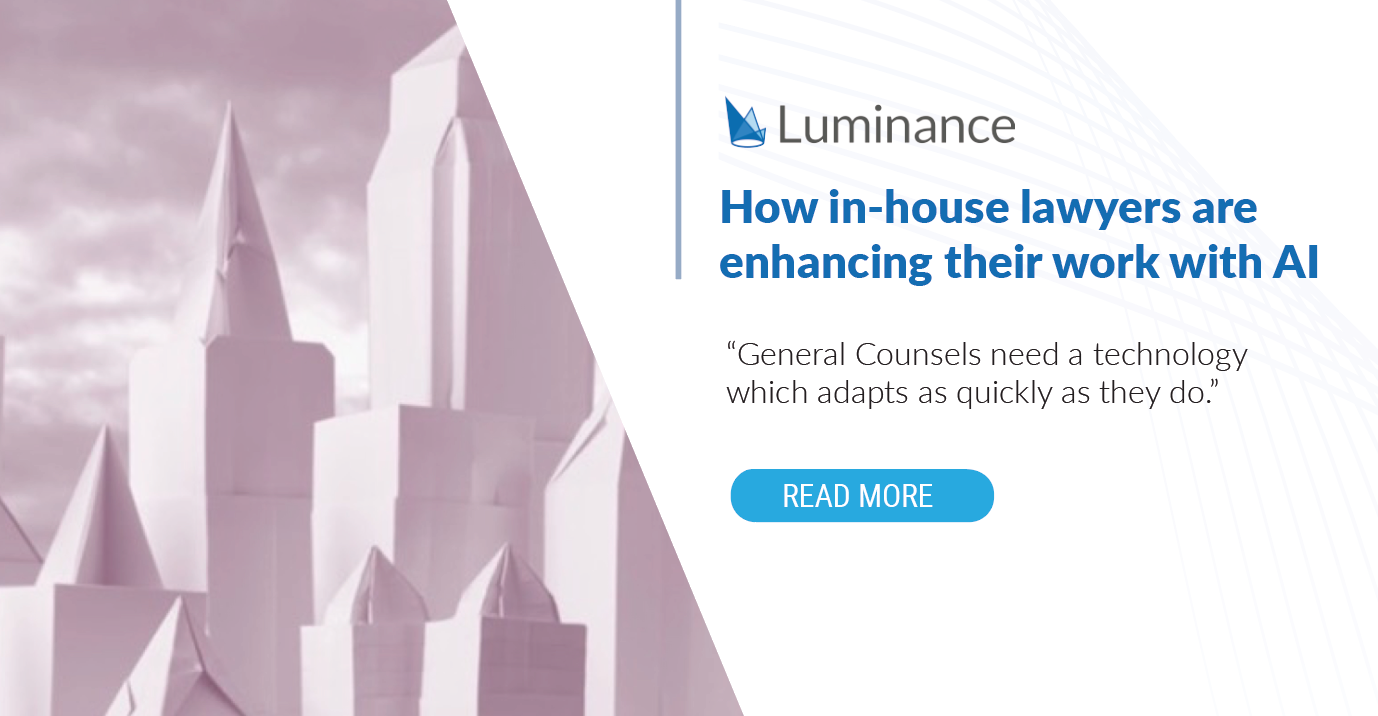
Blog
How in-house lawyers are enhancing their work with AI
29 July 2020 | Luminance
The last few years have seen a continued growth in the role and scope of General Counsels and in-house legal teams within organisations, and there are no signs of this trend stopping soon. In the UK, the number of lawyers working in-house more than doubled between 2002 and 2017, going from 13,000 to almost 28,000. A similar pattern can be seen in many other countries. As the remit of their role grows, in-house lawyers are increasingly searching for tools that can enhance the quality of their work whilst reducing overall costs for the business, particularly at a time of such uncertainty. In a recent Luminance webinar, Legal Product Expert Lottie Michael spoke about how in-house lawyers are increasingly utilising the power of AI to gain rapid insight and understanding into their documents.
An evolving role
As Lottie pointed out, much of the growth in the role of in-house lawyers is a result of the expanded role of General Counsels and in-house lawyers: “in the past many companies saw their general counsel as a technical specialist, only to be consulted in very specific circumstances. But now they are increasingly expected to provide advice, manage risk and ensure legal compliance.” Increasingly complicated legislation such as GDPR, CCPA and the LIBOR transition represents a significant legal challenge. As with their counterparts at law firms, in-house lawyers are also grappling with the explosion of business data which has increasingly rendered manual reviews unsustainable. Further, the growing globalisation of many businesses’ operations has added an additional layer of complexity to the work of General Counsels and their teams. In-house lawyers, therefore, need to be versatile and have the ability to work on a number of different projects simultaneously, particularly given the fast-moving legal situation created by the Coronavirus pandemic. As Lottie put it “General Counsels need a technology which adapts as quickly as they do.”
To empower lawyers in an increasingly complex and unpredictable legal environment, Luminance has created the Legal Inference Transformation Engine (LITE), a unique blend of cutting edge supervised and unsupervised machine learning developed by mathematicians from Cambridge University which can read and form an understanding of all documents within a dataset. After analysing documents, Luminance tags key information such as contract type, dates, parties, governing law and clauses. Luminance also flags anomalies to the lawyer so that they can prioritise potential risks at the beginning of the review. Luminance enhances lawyers’ review, allowing them to cut through large data sets to rapidly identify key documents pertinent to the matter at hand. Further, Luminance’s technology is adaptable to the considerable variety of projects that General Counsels work on, while Luminance’s language agnostic capabilities ensure lawyers can understand a vast range of documents within their organisation. This in turn enables in-house teams to quickly respond to new legislation or unforeseen challenges such as urgent force majeure reviews resulting from the Coronavirus pandemic.
Supporting their business
One key element of the evolution in the role of in-house lawyers has been their growing role in driving business growth. In Lottie’s view “many GCs would see themselves as business enablers.” Effective in-house lawyers are looking for technologies that can reduce costs and increase the volume of work that firms can handle. In this, the power of AI is an invaluable asset: instead of in-house teams wading through piles of near-identical documents spread across their enterprise, hunting down key information that could all too likely be missed in manual review, Luminance’ AI can help lawyers find subtle differences across thousands of documents.
Indeed, with AI-powered document review, firms can not only reduce the hours required for each project but also, because of the time savings Luminance generates, maximise the value of their team by redeploying them on additional projects that the firm would have otherwise not been able to undertake. For example, the legal team at one global retail bank that needed assistance with GDPR repapering saw time-savings of 80% by using Luminance when compared against their projected manual repapering time. Moreover, by using less resources on each project, General Counsels can undertake projects in-house that would otherwise have been too large or complex, thereby saving on costly outsourcing or external counsel fees.
In a world of increased data production, complex regulatory change, and a challenging economic environment, the value of AI for in-house lawyers wishing to adapt to new circumstances and enable greater business has never been clearer.